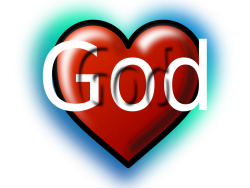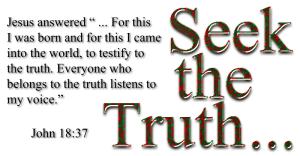|
|
| (503 intermediate revisions by 17 users not shown) |
| Line 1: |
Line 1: |
| − | Welcome to [[WikiChristian]], the free Christian Encyclopedia and Christian wiki community. We are building a Biblical Encylcopedia and an open source wiki amplified [[Bible]] based on the King James Version of the Holy Bible. We are wikifying the [[Public Domain]] Christian Classics enhancing the usability by using free interlinking of the Biblical terms using the easy [[wiki]] technology.
| + | <div style='text-align: right;'><small>[[Site-navigation|Menu]]</small></div> |
| | | | |
| − | A [[Wiki]] or wiki (pronounced "wicky", "weekee" or "veekee") is a website that allows a user to add content, as on an Internet forum, but also allows that content to be edited by anybody. Wiki wiki comes from the Hawaiian term for "quick" or "super-fast." Since the page history is stored, the pages can be reverted back in case of vandalism. Since its first introduction on March 25, 1995, as [[Portland Pattern Repository]] by [[Ward Cunningham]], [[Wiki Wiki Web]]s became quickly popular, thanks to the revolutionary concept of users being able to edit any page in the wiki by clicking edit the page button. Since the page history is stored, the pages can be reverted back in case of vandalism. The phenomenal success of wikis is exemplified by [http://en.wikipedia.org/wiki/Main_Page wikipedia], started in January 2001 working on over 433508 articles as of December, 2004.
| + | __NOEDITSECTION__ |
| | + | {| border="0" cellspacing="5" cellpadding="8" |
| | + | | colspan="2" style="background-color:#fcfcfc;border:1px solid #ccc;margin-top:.7em;" | |
| | + | {| style="width:100%;background-color:#fcfcfc;" border="0" |
| | + | | style="width:100%;color:#000" | |
| | + | {| style="width:100%;border:solid 0px;background:none" |
| | + | |- |
| | + | | style="padding-left: 12px;text-align:center;white-space:nowrap;color:#000" | |
| | + | <div style="font-size:162%;border:none;margin: 0;padding:.1em;color:#000"> |
| | + | [[Image:Wooden_cross.jpg|right|40px]] |
| | + | Welcome to [[Project:About|WikiChristian]] |
| | + | </div> |
| | + | <div style="top:+0.2em;font-size: 110%"> |
| | | | |
| − | [[WikiChristian]] is an open source [[copy left]] free Christian encyclopedia that anyone can edit and contribute to the collective knowledge and understanding on [[Christianity]], [[Bible]] and its [[beleivers]]. | + | A encyclopedia and discussion forum for all [[Christians]] to share their faith with [[Special:Statistics|{{NUMBEROFPAGES}}]] pages and over a million edits. [[Statement of Faith]] | [[WikiChristian Vision|Vision]] |
| | + | </div> |
| | | | |
| − | ---- | + | <div style="font-size: 115%"> |
| − | *[[Current Projects]]
| + | Special Links: [[WikiChristian:Bible|Bible Referencing]] | [[Project:Page Layout|Page Layout & Writing Guide]] | [[WikiChristian:Senior Editors|Senior Editors]] | [[WikiChristian needs your help!|WikiChristian Needs Your Help!]] |
| | + | </div> |
| | | | |
| − | ==[[Wiki Amplified King James Version]]== | + | |} |
| − | We are building a [[Biblical Encylcopedia]] and an open source wiki amplified [[Bible]] based on the Public Domain [[King James Version]] of the [[Holy Bible]].
| + | {| style="border-spacing:8px;margin:0px -8px" |
| | + | | class="MainPageBG" style="width:55%;border:1px solid #cef2e0;background-color:#f5fffa;vertical-align:top;color:#000" | |
| | + | <h2 style="margin:0;background-color:#cef2e0;font-family:sans-serif;font-size:120%;font-weight:bold;border:1px solid #a3bfb1;text-align:left;color:#000;padding:0.2em 0.4em;">What is Christianity? |
| | + | {| width="100%" cellpadding="2" cellspacing="5" style="vertical-align:top;background-color:#f5fffa" |
| | | | |
| − | ==[[Christian Classics Wiki Library]]== | + | |- |
| − | We are also [[wikifying]] the [[Public Domain]] [http://www.believerscafe.com/modules.php?name=Christian_Classics Christian Classics] enhancing the usefulness of the content by interlinking all the key words using.
| + | | style="color:#000" |{{featuredcontent}} |
| | | | |
| − | ==[[Wiki Amplified Easton's Bible Dictionary]]==
| + | [[God|Who is God?]] |
| − | We are enhancing the all time popular Public Domain [[http://www.believerscafe.com/ebd2.html Easton's Bible Dictionary]] in the wiki environment.
| + | [[Image:Love-Of-God-Heart-800px.png|right|250px]] |
| | | | |
| | + | *[[God]] | [[Jesus Christ]] | [[Holy Spirit]] | [[Essence of Christianity]] | [[Trinity]] |
| | | | |
| − | ==Christianity today==
| + | '''Current Projects''' |
| | | | |
| − | As of 2004, Christianity is the world's most widely practiced [[religion]], with 2 [[billion]] adherents (followed by [[Islam]] with 1.3 billion, [[Hinduism]] with 841 million, and the nonreligious with 774 million). Christianity has many branches, including 1.1 billion [[Roman Catholic Church|Roman Catholics]], 367 million [[Protestantism|Protestants]] in a number of traditions, 216 million [[Orthodox Christianity|Orthodox]], 84 million [[Anglicanism|Anglicans]], 414 million Independents (unaffiliated with the major streams of Christianity), and 31.7 million "marginals" ([[Jehovah's Witnesses]], [[Latter Day Saint]]s ([[Mormon]]s), etc.), these last being denominations which describe themselves as Christian but are not standardly recognized as such by other denominations.
| + | *[[Matthew Henry's Concise Bible Commentary]] |
| | | | |
| − | Although Christianity is the largest religion in the world and there are massive missionary efforts under way, as a whole it is declining in terms of the overall population. While the population of the world grows at roughly 1.25% per year, Christianity is growing at about 1.12% per year. By contrast, Islam is growing at 1.76% per year. The slow growth can be attributed to most of the Christian population residing in affluent nations where the [[birth rate]] is quite low. By contrast, Islamic nations have a higher birth rate and by effect have a larger growth percentage.
| + | *[[In the News]] |
| | | | |
| − | Not all people identified as Christians accept all, or even most, of the theological positions held by their particular churches. Like the Jews, Christians in the West were greatly affected by [[The Enlightenment]] in the late [[17th century|17th]] and early [[18th century|18th]] centuries. Perhaps the most significant change for them was total or effective [[separation of church and state]], thus ending the [[state religion|state-sponsored]] Christianity that existed in so many European countries. Now one could be a free member of society and disagree with one's church on various issues, and one could even be free to leave the church altogether. Many did leave, developing belief systems such as [[Deism]], [[Unitarianism]], and [[Universalism]], or becoming [[Atheism|atheists]], [[Agnosticism|agnostics]], or [[Humanism|humanists]].
| + | *[[Video of the Week]] |
| | | | |
| − | Others created liberal wings of Protestant Christian theology. [[Modernist Christianity|Modernism]] in the late [[19th century]] encouraged new forms of thought and expression that did not follow traditional lines.
| + | |} |
| | + | | class="MainPageBG" style="width:45%;border:1px solid #cedff2;background-color:#f5faff;vertical-align:top" | |
| | + | <h2 style="margin:0;background-color:#cedff2;font-family:sans-serif;font-size:120%;font-weight:bold;border:1px solid #a3b0bf;text-align:left;color:#000;padding:0.2em 0.4em;">[[WikiChristian:Contents|WikiChristian Contents]] - [[Christianity]] |
| | + | {| width="100%" cellpadding="2" cellspacing="5" style="vertical-align:top;background-color:#f5faff" |
| | | | |
| − | Reaction to "The Enlightenment" and Modernism triggered the development of literally thousands of Christian Protestant denominations, [[Catholic traditionalism|traditionalist]] splinter groups of the Catholic Church that do not recognize the legitimacy of many reforms the Catholic Church has undertaken, and the growth of hundreds of [[fundamentalist Christianity|fundamentalist]] groups that interpret the entire Bible in a characteristically literal fashion.
| + | |- |
| | + | | style="color:#000" | |
| | + | '''[[Bible]]''' |
| | | | |
| − | In the [[United States]] and [[Europe]], liberalism also led to [[secularism]]. Some Christians have long since stopped participating in traditional religious duties, attending churches only on a few particular holy days per year or not at all. Many of them recall having highly religious grandparents, but grew up in homes where Christian theology was no longer a priority. They have developed ambivalent feelings towards their religious duties. On the one hand they cling to their traditions for identity reasons; on the other hand, the influence of the secular Western mentality, the demands of daily life, and peer pressure tear them away from traditional Christianity. [[Marriage]] between Christians of different denominations, or between a Christian and a non-Christian, was once taboo, but has become commonplace. Traditionally Catholic countries such as France have largely become agnostic, also with a large number of followers of [[Islam]], which is growing rapidly, and similar trends are reflected in various degrees in Western Europe.
| + | > '''[[Old Testament]]''' |
| | | | |
| − | Liberal Christianity grew rapidly during the early [[20th century]] in Europe and North America, by the [[1960s]] gaining the leadership of many of the larger US and Canadian denominations. However, this trend has reversed. At the turn of the [[21st century]], though secular society tends to consider the more accommodating liberals as the representatives and spokesmen of Christianity, the "mainline" liberal churches are shrinking. This is partly due to a loss of evangelistic zeal, partly due to drift of their membership to conservative denominations, and partly due to the failure of one generation to pass on Christianity to the next. Among the larger Protestant denominations in the USA, only the conservative [[Southern Baptist Convention|Southern Baptist]] is growing. Evangelical para-church organizations have grown rapidly in the last half of the 20th century. The liberal [[Christian Century]] magazine has shrunk, while being replaced by its challenger, the rapidly growing evangelical [[Christianity Today]].
| + | [[Genesis]] | [[Exodus]] | [[Leviticus]] | [[Numbers]] | [[Deuteronomy]] | [[Book of Joshua|Joshua]] | [[Book of Judges|Judges]] | [[Book of Ruth|Ruth]] | [[1 Samuel]] | [[2 Samuel]] | [[1 Kings]] | [[2 Kings]] | [[1 Chronicles]] | [[2 Chronicles]] | [[Book of Ezra|Ezra]] | [[Book of Nehemiah|Nehemiah]] | [[Book of Esther|Esther]] | [[Book of Job|Job]] | [[Psalms]] | [[Proverbs]] | [[Ecclesiastes]] | [[Song of Solomon]] | [[Book of Isaiah|Isaiah]] | [[Book of Jeremiah|Jeremiah]] | [[Book of Lamentations|Lamentations]] | [[Book of Ezekiel|Ezekiel]] | [[Book of Daniel|Daniel]] | [[Book of Hosea|Hosea]] | [[Book of Joel|Joel]] | [[Book of Amos|Amos]] | [[Book of Obadiah|Obadiah]] | [[Book of Jonah|Jonah]] | [[Book of Micah|Micah]] | [[Book of Nahum|Nahum]] | [[Book of Habakkuk|Habakkuk]] | [[Book of Zephaniah|Zephaniah]] | [[Book of Haggai|Haggai]] | [[Book of Zechariah|Zechariah]] | [[Book of Malachi|Malachi]] |
| | | | |
| − | The Enlightenment had much less impact on the Eastern Churches of Eastern and Oriental Orthodoxy. Having to face a much more hostile secular society, especially during the rise of [[Communism]], the church clung to ancient beliefs, even as its membership eroded.
| + | > '''[[New Testament]]''' |
| | | | |
| − | Today in [[Eastern Europe]] and [[Russia]], a renewing trend is taking place. After decades of Communism and [[atheism]], there is widespread interest in Christianity, as well as religion in general. Many Orthodox churches and monasteries are being rebuilt and restored, filled beyond capacity; Protestants of many denominations are pouring in to evangelize and plant churches; and the Catholic church is revealing once secret dioceses and undertaking other steps to support Catholic churches more openly.
| + | [[Gospel of Matthew|Matthew]] | [[Gospel of Mark|Mark]] | [[Gospel of Luke|Luke]] | [[Gospel of John|John]] | [[Acts of the Apostles|Acts]] | [[Epistle to the Romans|Romans]] | [[First Epistle to the Corinthians|1 Corinthians]] | [[Second Epistle to the Corinthians|2 Corinthians]] | [[Epistle to the Galatians|Galatians]] | [[Epistle to the Ephesians|Ephesians]] | [[Epistle to the Philippians|Philippians]] | [[Epistle to the Colossians|Colossians]] | [[First Epistle to the Thessalonians|1 Thessalonians]] | [[Second Epistle to the Thessalonians|2 Thessalonians]] | [[First Epistle to Timothy|1 Timothy]] | [[Second Epistle to Timothy|2 Timothy]] | [[Epistle to Titus|Titus]] | [[Epistle to Philemon|Philemon]] | [[Epistle to the Hebrews|Hebrews]] | [[Epistle of James|James]] | [[First Epistle of Peter|1 Peter]] | [[Second Epistle of Peter|2 Peter]] | [[First Epistle of John|1 John]] | [[Second Epistle of John|2 John]] | [[Third Epistle of John|3 John]] | [[Epistle of Jude|Jude]] | [[Book of Revelation|Revelation]] |
| | | | |
| − | In [[South America]] and [[Africa]], Evangelical and Pentecostal Christianity form rapidly growing movements that are increasingly sending [[missionary|missionaries]] to Europe and North America. This is also true of [[Asia]] where many of the underground house churches intend to send hundreds of thousands of missionaries out over the next decade.
| + | *[[Christian literature, art, music and media]] | [[Christian Songs Index]] |
| | + | *[[Church]] | [[Church history]] | [[Denominations]] |
| | + | *People: [[Famous Christians]] | [[:Category:Media Workers|Media Workers and Volunteers]] |
| | | | |
| − | As Modernism developed into [[Consumerism]] during the second half of the [[20th century]] the [[Megachurch]] phenomenon developed – catering for skeptical non-Christians by providing "seeker sensitive" presentations of Christian belief. The [[Alpha Course]] can be viewed as an example one such presentation of Christianity.
| + | [[Image:Seek-The-Truth-800px.png|right|300px]] |
| | | | |
| − | Since the development of [[Postmodernism]] with its rejection of universally accepted belief structures in favour of more personalized and experiential truth, organized Christianity has increasingly found itself at odds with the desire many people have to express faith and spirituality in a way that is authentic to them. What has thus far been known as the [[Emerging Church]] is a by-product of this trend, as many people who broadly accept Christianity seek to practice that faith while avoiding established Church institutions.
| + | *[[Christian doctrine and debates]] | [[Grace]] | [[Love]] |
| | + | *[[Current issues]] | [[News]] |
| | + | *[[Science and Technology]] |
| | + | *[[Other religions]] |
| | + | *[[Places]] | [[Mission]] | [[World-wide church directory]] |
| | | | |
| − | Another reaction of some Christians to [[Postmodernism]] is the advent of what might be called [[Postmodern Christianity]].
| + | |} |
| | | | |
| − | A large and growing movement within the Christian church, especially in the West and most visible in the United States, is the [[evangelical]] movement. Most mainstream [[protestant]] denominations have a significantly active [[evangelicalism|evangelical]] minority, and, in some cases, a dominant majority (see [[Confessing Movement]]). Evangelicals are "trans-denominational" and are more willing to have formal and informal relationships with evangelicals from outside their denomination than to have the same sort of relationship with non-evangelicals within their denomination.
| + | |} |
| | | | |
| − | Some evangelicals have been [[schism|schismatic]] within various church organisations, leaving to form their own denominations. More often they are forced out. It was only by dint of sheer determination that [[John Wesley]], founder of [[Methodism]], was able to remain an Anglican priest against intense opposition. His followers separated in America, and in England after his death. Some Evangelicals claim that their beliefs are no less than true Christianity itself and that those within the church who differ from them may not be true believers. This attitude has led to much disunity amongst churches, especially those with a large modernist influence. Evangelicals cannot be easily categorised, but almost all will believe in the necessity of a personal conversion and acceptance of Jesus as saviour and Lord, the eventual literal [[Parousia|return of Christ]], a more conservative understanding of the Bible and a belief in the miraculous. There are many different types of Evangelicals including [[Dispensationalism|Dispensationists]], [[Reformed theology|Reformed Christians]], [[Pentecostalism|Pentecostals]], [[Charismatic|Charismatics]] and [[Fundamentalist Christians|Fundamentalists]].
| + | <!-- DAILY'S DEVOTION --> |
| | + | {| id="mp-lower" style="margin:4px 0 0 0; width:100%; background:none; border-spacing: 0px;" |
| | + | | class="MainPageBG" style="width:100%; border:1px solid #ddcef2; background:#faf5ff; vertical-align:top; color:#000;" | |
| | + | {| id="mp-bottom" style="width:100%; vertical-align:top; background:#faf5ff; color:#000;" |
| | + | | style="padding:2px;" |<h2 id="mp-tfp-h2" style="margin:3px; background:#ddcef2; font-family:inherit; font-size:120%; font-weight:bold; border:1px solid #afa3bf; text-align:left; color:#000; padding:0.2em 0.4em">Devotion Of The Day</h2> |
| | + | |- |
| | + | | style="color:#000; padding:2px;" |<div id="mp-tfp">{{Template:DOD protected}}</div> |
| | + | |} |
| | + | |} |
| | + | |
| | + | __NOTOC__ |
| | + | |} |
| | + | |} |


